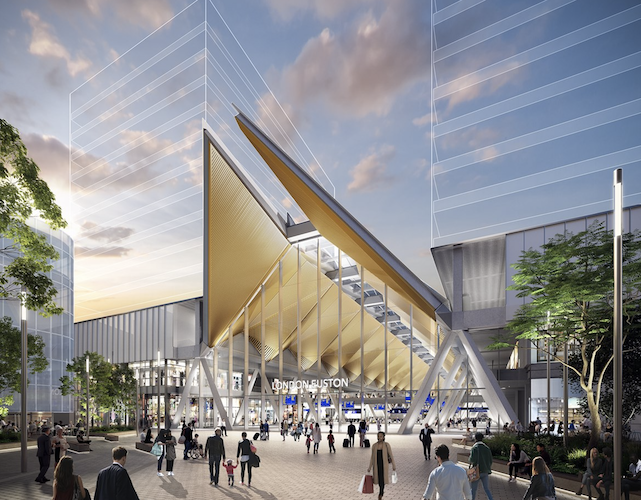Fully shutting down the HS2 Euston station site following the government’s decision in March to impose a two-year construction “pause” will take six months and cost some £220 million, MPs on the House of Commons public accounts committee heard this week.
Officials also warned that spiralling cost estimates for the complex station scheme – now standing at £4.8 billion against the 2020 budget of £2.6 billion – could put much of the original plan at risk, including the intended “over site” regeneration of the wider area billed to deliver 2,000 homes and 15,000 jobs.
“I was as dismayed as anybody when suddenly a figure of £4.8 billion emerged,” Department for Transport (DfT) permanent secretary Bernadette Kelly admitted, while HS2 chief Mark Thurston suggested that the intricacy of the plans had meant a reassessment of them would always have been necessary.
“You don’t really know what it is going to cost until the marketplace has priced it,” he said. “We always knew we would have to come back and reappraise.” Committee chair Meg Hillier, MP for Hackney South & Shoreditch, suggested in response that this hadn’t been made “clear enough” to the wider public.
The pause, Thurston added, was “an opportunity to draw breath and decide where we go next. We’ve got to work out what version of the station is going to come out of the other side of this. We have an unaffordable version at the moment.”
That would mean difficult decisions said Alan Over, the senior DfT official managing HS2. The various “interested parties”, including Network Rail, Transport for London (TfL) and Camden Council, now needed to have a second look at their shopping lists, he said. “There are choices in how many requirements we have and how we meet those requirements.”
That could mean stepping up investment to deliver the planned “integrated” station fully linking up HS2, mainline rail and the Underground as well as spending more on the wider development to “maximise value”, but it could also mean the opposite, Over said. Options might include scaling back the development, or planning for less affordable housing, “even though that might not be welcome in terms of the economic regeneration which is part of the aim”.
But the government had to date vetoed using the proceeds of development to fund the new station, Kelly said. “I am not going to overstate that option,” she added. “We have not been using the receipts from over site development to fund this station, and that was a decision taken by government following discussions with Treasury.”
Kelly referred the committee to the recent National Audit Office report on the Euston scheme, which confirmed that while the DfT had considered funding “enabling” works for the wider development from the “expected proceeds from the sale of land”, the Treasury had rejected that approach “on the basis that the case for additional investment was uncertain”.
The pause also puts in doubt the future of the Euston Partnership, set up in 2020 to “actively promote and enable closer collaboration and joint working” between all partners involved in the programme, including TfL, City Hall and Camden. “The partnership was helping with the previous scheme,” said Over. “There is the possibility we may need different downstream integration arrangements. We will have to review that.”
In a written submission to the committee, Camden spelt out the continuing “pain of construction” for residents and businesses, including the well-known Drummond Street Indian restaurants, despite the pause offering some respite. The council urged that “meanwhile” uses for appropriate parts of the site should be brought forward. Over site development was also “critical to the future success and long-term economic gains from the site, and must not be sacrificed,” the council added.
The possibility of some temporary uses would be discussed with the council and residents, Thurston said. Other works to be carried out over the coming months would include completing a new substation and construction skills centre, utilities work along with opening some currently closed roads, pushing back hoardings to reduce the overall size of the boarded-off site, and creating new public open space in place of the current taxi rank.
The full committee session can be viewed here. Follow Charles Wright on Twitter.
On London strives to provide more of the kind of journalism the capital city needs. Become a supporter for just £5 a month. You will even get things for your money. Learn more here.

